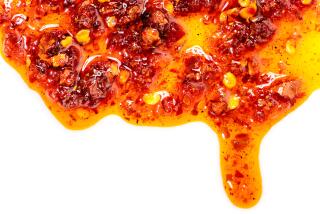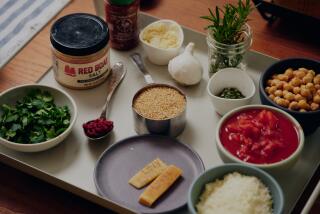Some like it hot. Really hot.
Maybe it’s the sense of danger that reels you in at first. The crazy name, the wild picture slapped on the bottle. Before you know it, you’re on for the ride, and the best ones leave you reduced to a sweaty and speechless mess. When it’s finally over, you can’t help but want more.
I’m talking about hot sauce, a virtual thrill ride for the taste buds. And for fans, nothing beats the feeling.
So what makes hot sauce so attractive? Blame it on the capsaicin, the chemical behind a chile’s heat. When you eat hot sauce, or any chile-spiced foods, your mouth reacts to the capsaicin as if it’s in pain, signaling the brain. Your body responds by releasing endorphins, much like it does with laughter, chocolate, stress and sex.
Pleasure and pain, conveniently packaged in a bottle. All I know is I can’t get enough of the stuff. I have a collection at home and drizzle at least one sauce -- more often two -- over everything. A sure sign of a junkie, lately I’ve even taken to making my own.
It’s amazingly simple. A puree of chiles and salt, thinned perhaps with vinegar or water, maybe a secret ingredient or blend of spices thrown in for good measure. Voila.
For a quick Sriracha-type sauce, take a pound of fresh red chiles -- red Fresnos and jalapenos can generally be found year-round -- and mash them with fresh garlic and salt, a touch of sugar and vinegar. A little love on the stove-top -- simmering the mash helps to marry the flavors -- then blend and strain the sauce, thinning as desired with water. The sauce literally comes together in minutes (as opposed to fermented hot sauces, which can take days, or more, to make). And while it tastes good right away, it gets even better after a day or two in the fridge.
Play around with the sauce to personalize it to your tastes, changing up chiles and flavorings. For a Caribbean jerk-inspired hot sauce, use the same method but switch out the Fresnos for Scotch bonnets or habaneros, rounding out the flavors with fresh ginger and green onion, lime, a blend of spices and a touch of dark rum. Playfully sweet and fruity at first, the heat will sneak up on you in the most wonderful way.
The variations are endless. Probably the hardest part to a great homemade hot sauce is giving your wonderfully potent creation a fitting name. I simply call mine “Shock in a Bottle.”
--
--
(BEGIN TEXT OF INFOBOX)
--
The incendiary anatomy of a chile
A quick note on heat: Capsaicin is found in the inner ribs, or veins, of chiles, not just the seeds. To minimize the heat (why you’d ever want to do that, I don’t know), remove the ribs with the seeds. And when working with chiles, be careful. The capsaicin in the oils can burn your hands and eyes. Wear gloves when handling the hottest chiles, and work in a well-ventilated area.
Chile heat varies by type, with Anaheim and pasilla on the milder end and jalapenos and serranos packing somewhat more of a punch. Habaneros (or Scotch bonnets if you can find them) are legendary, and even naga jolokia (the ghost chile) is increasingly easier to find. For true hotheads, you can buy pure capsaicin by itself for a practically weapon-grade sauce.
Fresh green chiles are fine, though the flavor can be a little underripe and “grassy.” Ripe red chiles are the best, though they are generally seasonal, available typically late summer through early fall.
Dried chiles can be found year-round, their flavor more concentrated and complex than fresh chiles. To use them in a sauce, toast them briefly over a hot skillet to add smoky notes, then soak them in hot water to soften. Once softened, they can be used just like fresh.
--
Noelle Carter
--
Sriracha-style hot sauce
Total time: 25 minutes
Servings: Makes about 11/2 cups sauce
Note: This sauce should be prepared in a well-ventilated area and is best prepared at least 1 to 2 days before using. Cane vinegar and palm sugar can be found at select well-stocked cooking stores, as well as Asian markets.
--
1 pound mixed fresh red chiles (such as red Fresnos or jalapenos), stemmed and chopped
2 to 4 cloves garlic
1/4 cup cane or rice vinegar
1 1/2 teaspoons sea salt, more if desired
2 tablespoons palm or light brown sugar, more if desired
1. In the bowl of a food processor, pulse together the chiles, garlic, vinegar, salt and sugar to form a coarse paste.
2. Transfer the mixture to a non-reactive saucepan and simmer, stirring occasionally, until the aroma softens or mellows a bit, about 5 minutes. Remove from heat.
3. Blend the sauce again to form a smooth paste, thinning as desired with water.
4. Strain the sauce, pressing the solids through a fine mesh strainer with a rubber spatula or wooden spoon. Taste the sauce, and tweak the flavors as desired with additional salt, sugar or vinegar. Remove the sauce to a glass jar or bottle and cool completely. Refrigerate until needed.
Each tablespoon: 13 calories; 0 protein; 3 grams carbohydrates; 0 fiber; 0 fat; 0 cholesterol; 2 grams sugar; 133 mg sodium.
--
Caribbean jerk-style hot sauce
Total time: 30 minutes
Servings: Makes about 3 cups hot sauce.
Note: The sauce should be prepared in a well-ventilated area. Muscovado sugar can be found at most cooking and baking supply stores. Wear gloves while chopping the Scotch bonnet or habanero peppers because the heat in the oils can sting your hands. Wash your hands thoroughly after handling the peppers.
--
1 1/2 teaspoons freshly ground black pepper
3/4 teaspoon grated nutmeg
1 1/2 teaspoons ground allspice
1/2 teaspoon ground cinnamon
1/4 teaspoon ground cloves
2 tablespoons salt
1/4 cup muscovado or dark brown sugar
6 to 9 Scotch bonnet or habanero peppers, stemmed and chopped
4 teaspoons minced garlic
1 tablespoon minced ginger
2 bunches scallions, chopped (green and white parts)
Zest and juice of 4 limes
1/4 cup distilled white vinegar
1/4 cup dark rum
1/4 cup oil
1/2 to 1 cup water
1. In the bowl of a food processor, combine the pepper, nutmeg, allspice, cinnamon, cloves, salt, sugar, peppers, garlic, ginger, scallions, lime zest and juice, vinegar, rum and oil. Pulse a few times to form a coarse paste.
2. Transfer the mixture to a medium, heavy-bottomed saucepan and simmer for 3 to 5 minutes, stirring frequently, to marry the flavors.
3. Remove from heat. Place the mixture back in a food processor or blender and blend to form a smooth sauce, thinning as desired with one-half to 1 cup water. Strain if desired. To store, refrigerate the sauce in a covered glass bottle or jar.
Each tablespoon: 16 calories; 0 protein; 2 grams carbohydrates; 0 fiber; 1 gram fat; 0 saturated fat; 0 cholesterol; 1 gram sugar; 195 mg sodium.
More to Read
Eat your way across L.A.
Get our weekly Tasting Notes newsletter for reviews, news and more.
You may occasionally receive promotional content from the Los Angeles Times.









